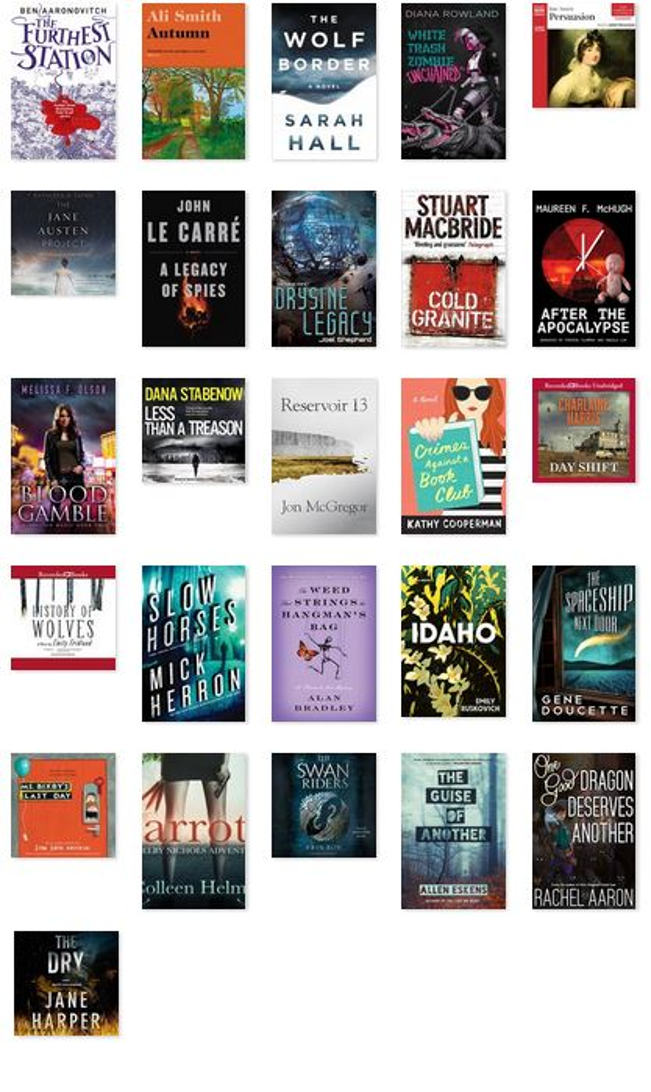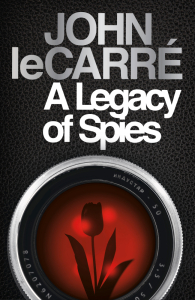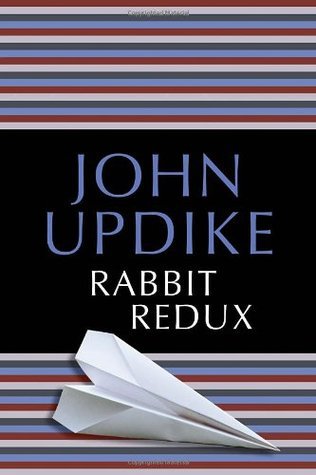 I felt in need of a bit more stimulation this quarter so I spiced my normal diet of urban fantasy, crime and science fiction with some mainstream reading, partly driven by this year’s Mann Booker Prize Longlist. On impulse, I also added British spy fiction to the mix with surprisingly pleasing results.
I felt in need of a bit more stimulation this quarter so I spiced my normal diet of urban fantasy, crime and science fiction with some mainstream reading, partly driven by this year’s Mann Booker Prize Longlist. On impulse, I also added British spy fiction to the mix with surprisingly pleasing results.
My staple genre diet was also very rewarding with the long-awaited twenty-first Kate Shugak novel “Less Than A Treason”, a strong Scarlett Bernard story in “Blood Gamble” , one of the best Angel Crawford books, “White Trash Zombie Unchained” and a short but entertaining new Peter Grant story in “The Furthest Station”.
It was such a good three months that it was more difficult than usual to select the best and most disappointing of the twenty-six books I’ve read but here they are.
Best Mainstream Reads of the QuarterNormally I’d just pick one best read here but this quarter’s offerings were so strong, I indulged myself with three remarkable books.
 “Reservoir 13” by Jon McGregor as my favourite of the three books I read from the 2017 Mann Booker Prize Longlist although it didn’t make the Shortlist-
“Reservoir 13” by Jon McGregor as my favourite of the three books I read from the 2017 Mann Booker Prize Longlist although it didn’t make the Shortlist-
It shows how life is lived in a village over thirteen years, season by season, giving a .surface view of all the things that people in a small village know about each other: the gossip, the constant observation of each other’s acts and the things they don’t say or don’t ask. I came to understand how the politeness of being indirect grants dignity and privacy while still offering the possibility of sharing the things you cannot bear alone.
The people in the village are following the same tidal flows as the wildlife around them and, just as I learned about the courtship of badgers in the woods, I was shown that most human mating rituals are led by women and conducted through body language and eye contact more than words.
The missing girl is not the centre of the book but rather something that distorts the flow of village life without adding to it, She is like a waterlogged piece of driftwood that only occasionally surfaces but is always there, disturbing the peace of the water.
“Reservoir 13” has a distinct voice and an unusual structure that did, eventually, imprint the village on my imagination and made me reluctant to leave. The narrative doesn’t thrust, it shapes your perception of people and events with gentle persistence, like a stream eroding one bank and building up another. It has stayed with me in the weeks since I read it and grown richer in my memory like a place visited and fondly remembered.

“The Wolf Border” has a strong plot that deals with politics and class and the struggle between the wild and the civilized. On that level alone it would be compelling but what sets it apart is Sarah Hall’s muscular writing and her unflinching insights into people.
The language is sometimes beautiful, sometimes brutal, always precise. The people are complex and real. The book is filled with sex, death, science, addiction, grief, motherhood and many varieties of love and distaste.
The sex is described with an honesty that is so unusual it is almost shocking. The raw pain and anger that death produces in those who are forced to watch it and survive it are graphically evoked. The overwhelming experiences of pregnancy and early motherhood are embraced without being romanticised.
One the themes of this book is rewilding, the untaming of our countryside by returning to it predators that we have long since exterminated. Rachel Caine is working towards this and,
“…would like to believe there will be a place again where the street lights end and wilderness begins: the wolf border.”
Rachel walks this border throughout the book, sometimes seeing herself and those around her primarily as animals dominating their territory but still driven by basic needs and urges, sometimes feeling the pull to retreat from that wilderness into a safer world where she can protect the family and friends that she loves.
 “Idaho” by Emily Ruskovich deserves a much larger audience than it seems to have achieved. Each chapter is a work of art. Emily Ruskovich can write in a way that makes you fully aware of how a particular person is experiencing something that is vivid and immediate but also ladened with context and possibility.
“Idaho” by Emily Ruskovich deserves a much larger audience than it seems to have achieved. Each chapter is a work of art. Emily Ruskovich can write in a way that makes you fully aware of how a particular person is experiencing something that is vivid and immediate but also ladened with context and possibility.
It is an intense, absorbing experience that speaks to my senses and my emotions but, by itself, does not satisfy my need for a narrative leading to some form of release.
The nonlinear nature of this narrative, the emphasis on moments of being and intense but bounded insights into a person, meant that reading “Idaho” felt more like experiencing other people’s lives than it did reading a novel with a beginning, a middle and an end. I was given lots of hard, emotionally taxing questions but I was offered only the inference of answers, much as I am in real life.
There is a narrative. It is triggered by an act of violence that changes the lives of almost all of the characters in the book. Revealing this narrative in a non-linear way is not done to enhance the tension or to build to a great reveal, but to show that we are not the events that we live through. They can harm us or help us but the self we bring to each moment is what shapes the outcome of an event.
Best New Finds of the Quarter “A Legacy of Spies” was my first John Le Carré novel and my biggest surprise of the quarter.
“A Legacy of Spies” was my first John Le Carré novel and my biggest surprise of the quarter.
What surprised me most was how beautiful the language is. Le Carré writes with clarity and precision, capturing nuances of speech, thought and culture with deft touches that are evocative without being obtrusive. He moves skillfully from past to present, from lie to truth, from regret to rage, in a way that fully engaged my mind and my emotions.
The premise of the book is a present-day investigation into British security operations during the Cold War. It is told through contemporary interrogations by a rather loathsome lawyer, extracts from official, secret but not necessarily truthful records and intensely intimate memories of Peter, the retired spy from whose point of view the story is told.
This is a strong spy story, full of intrigue and deception and betrayal but those are really just the vehicle for the true heart of the novel, which seems to me to be an exploration of the nature of patriotism and the inability and unwillingness of the current generation to understand the context of the actions of the previous generation.
As I shared Peter’s memories and experiences, his secrets and his regrets, I was reminded of a time when Russia was our overt enemy, holding half of Europe in its totalitarian fist and threatening the other half with conquest or extinction. Patriotism then was a matter of survival not nostalgic flag waving.
“A Legacy Of Spies” is not a polemic disguised as a novel, It is fundamentally a very human story of love and sacrifice and deception and regret and most of all, of endurance.
 “Ms. Bixby’s Last Day” by John David Anderson wins my nomination for “book that would make a classic movie”
“Ms. Bixby’s Last Day” by John David Anderson wins my nomination for “book that would make a classic movie”
My blurb for the book would say:
“Read this book. It’s wonderfully written, perfectly structured and shares the lives. problems, passions and fears of three young boys in a way that feels real and true without ever getting schmaltzy or maudlin.”
The book is told as three first-person accounts, with each boy getting a chapter in turn. The pace of both plot and character development are perfect. There is a quest structure that is amusing and exciting and sad in turns but never leaves the real world behind.
At the centre of the book are three very different boys who each have a particular take on friendship, a teacher they all love but who is neither a saint nor a superhero and their mission to provide her with a perfect last day.
What I liked most about the book was the way the character of each boy was slowly built up through a series of interlocking events and insights that deepened my experience as the book progressed.
I strongly recommend the audiobook version of “Ms. Bixby’s Last Day”. Each of the boys has their own narrator, which emphasises their individuality. The performances are pretty close to perfect.
Best New Series of the Quarter
 Set in the perpetually rain-drenched granite streets of Aberdeen, “Cold Granite” tells the story of DS Logan “Lazarus” McRae’s return to work after a long sick leave recovering from a knife attack. On his first day back he ends up investigating the death of a young child.
Set in the perpetually rain-drenched granite streets of Aberdeen, “Cold Granite” tells the story of DS Logan “Lazarus” McRae’s return to work after a long sick leave recovering from a knife attack. On his first day back he ends up investigating the death of a young child.
What follows is a very Scottish police procedural, crammed with local colour, larger than life characters, raucous humour and unflinching descriptions of death, decay and violence.
The pace is perfect. The relationships inside the police force and between the police officers and the press felt very real. There are plenty of credible suspects, a twisted trail of crimes and criminals and, at the heart of it all, a young DS still learning his trade. McRae works hard, is not yet comfortable with his rank, occasionally screws up but mostly spends his energy doggedly pulling together the pieces of the puzzle that can lead him to the murderer.
.
 “Slow Horses” is a (very) British spy thriller, set in contemporary London, in the post 7/7 bombing world of domestic anti-terrorism.
“Slow Horses” is a (very) British spy thriller, set in contemporary London, in the post 7/7 bombing world of domestic anti-terrorism.
The slow horses of the title are security service people who have messed up and have been cut out of the herd of thoroughbreds with whom they’ve demonstrated they can’t keep up. Their punishment is being sent to work at Slough House where they are given pointless routine work that is meant to demoralize them to the point where they will resign and save the Service the trouble of firing them.
Slough House is run as a fiefdom by Jackson Lamb, a mercurial despot with a reputation as a dangerous field agent. Discovering why he is there and what he wants is one of the mysteries of the book. His staff are a mixed bunch but it soon becomes clear that some of them are not what they seem. In the world that these folks inhabit, little is what it seems.
The plot revolves around the abduction and threatened execution of a boy of Pakistani descent by a group of right-wing nationalist extremists. This takes us into BNP, EDL deluded English Nazis. The plot is cunning without ever becoming Byzantine. The storytelling keeps the tension cranked up and throws in lots of surprises. The characters and how they interact with each other are credible and compelling. This is Le Carré for the modern day, with a faster pace and a new set of issues.
“Slow Horses” is a good thriller made exceptional by the plausibility of the people and the situations. It seems like an insider’s view. As one of the retired Service guys says of Le Carré in this book, “Just because it’s made up doesn’t mean it’s not true”.
Biggest Disappointment of the Quarter
“The Guise Of Another” was a very disappointing read. It was a book I persevered with rather than savoured.
It started as a fairly conventional police procedural novel, albeit with the original premise of finding that the victim of a fatal car accident had been living “in the guise of another”. The police procedural part lasted for a (very slow) first hour or so and then the book took a left turn into thriller land.
The idea was interesting but the characters were so clichéd I’m sure you’ll have met them before. Imagine a gone-to-seed, corrupt, American arms dealer, running a decades-long scam on the Department of Defense. Then add the stone-cold killer from Serbia who acts as his muscle. Got a clear picture of both of them? Not hard is it? Not that interesting either, sadly.
The plot devices are clever. The action scenes are engaging. The pacing is often a little off. The characters read like a first draft rather than real people. The language and the imagery are functional and pedestrian.
Apart from the satisfaction of solving the puzzle and seeing if any of the good guys manage to survive, I really didn’t care about the events in this book or the people they were happening to.
What made this so disappointing is that I bought “The Guise Of Another” because I fell in love with Eskens’ first novel, “The Life We Bury”, which was a beautifully written thriller with well-rounded characters
Advertisements Rate this:Share this:- Share





